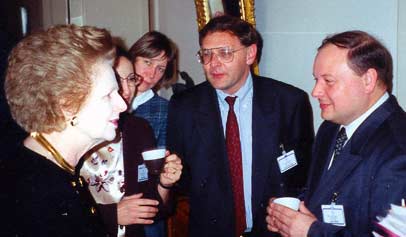2006: Russia Returns to Dictatorship
From the desk of Paul Belien on Wed, 2005-12-28 15:36

Four months ago the Brussels Journal published a piece about Andrei Illarionov, the chief economic adviser to Russian President Vladimir Putin. Illarionov had surprised his fellow members of the Mont Pelerin Society (MPS) at a meeting in Reykjavik when he warned them that his boss was abolishing economic and political freedom in Russia. This, he said, was obvious in a number of areas: The Russian authorities are reaffirming their stranglehold on the economy. They have effectively nationalized the oil and gas industry. The bureaucracy and the military are on the rise. The rule of law is diminishing.
Yesterday Mr Illarionov handed in his resignation. The 44-year old economist, who came to the Kremlin with Putin six years ago, said that Russia’s nascent political freedoms have been lost and that he no longer has the ability to influence the government’s course. “When I took the job, we spoke about conducting a liberal economic policy. Now, the state has evolved in quite the opposite direction,” he told reporters. “I did not agree to work with a state like this. I did not sign a contract with it. I did not swear to it. I am not going to work with such a state. It’s one thing to work in the partially free country that Russia was six years ago and another thing to do so when the country has ceased to be politically free.”
Mr Illarionov’s resignation comes as an embarrassment to President Putin because next Sunday Russia will assume the presidency of the G8, the Group of Eight industrial nations. Illarionov was dismissed from his position as Russia’s envoy to the G8 early this year after he had criticized the nationalization of the oil and gas industry – a move which, he said, showed that Russia had been infected with the “Venezuelan disease.” Yesterday Illarionov added that Russia now also suffers from the “Saudi disease.” He defined this disease as the use by a country of its energy exports to pressure other states. In his words, Russia’s energy reserves have become “a weapon.”
Though Russia’s democratic neighbours – the Ukraine, Poland and the Baltic states – are worried about this evolution, Western Europe has turned a blind eye to the worsening situation in Russia. Illarionov seems to understand why. He said last week that the Kremlin is introducing a “corporatist model” of the state. The European Union is in many respects also a corporatist model (in which the political and economic elite collude to force policies upon the people without taking the people’s wishes into account). This may explain why Europe has not devoted much attention to Illarionov’s warnings during the past year. According to Yevgeny Gavrilenkov, chief economist at Troika Dialog, “Most of what Illarionov said was completely ignored. If you look at investors, those who make decisions, for them his voice has been of secondary importance.” Eric Kraus, the chief strategist at Sovlink Securities, said Illarionov was too outspoken – “a problem […] that would get him fired in any European country overnight.”

Illarionov says that he intends to remain in Russia and hopes to be able to do some good – but not in politics. In the early 1990s, he was an adviser to the then Prime Minister Yegor Gaidar, the first post-Soviet Prime Minister of Russia. Gaidar advocated capitalist economic reforms, but did not get the necessary support from then President Boris Yeltsin. He left government in 1994 but is still a member of the Duma, the Russian parliament. Margaret Thatcher was a great admirer of Gaidar, as I witnessed in May 1996, when the latter was talking to a group of us in Prague and Mrs Thatcher came up to him to express her support.
Unfortunately, as we reported earlier, President Putin has Western collaborators who assist him in his political and geopolitical strategies. The most infamous of these is the former German chancellor Gerhard Schröder. Last September, during his final weeks in office, Herr Schröder signed an agreement with Russia to build a pipeline on the Baltic seabed. The pipeline, which is to be finished by 2010, will provide Germany with gas directly from Russia, bypassing transit through the countries of Central and Eastern Europe. Immediately after his resignation as Chancellor, Schröder was given a lucrative position as an advisor of the Russian state-owned gas company Gazprom. The gas deal is generally perceived as being a private pension scheme which Schröder – a Socialist – has provided for himself.
The new pipeline will allow Russia to squeeze the nations that it occupied until fifteen years ago. One of these countries is the Ukraine. Gazprom has already threatened to cut off supplies to this country from January 1st, if Kiev does not agree to pay prices over four times higher than the current ones. Ukrainian officials have accused Russia of trying to raise prices and tighten supply during the winter as part of an effort to influence Ukraine’s parliamentary elections in March and help a pro-Kremlin coalition to gain power. Russia says it simply wants to receive the same market price from Eastern and Central Europe that it can get for its gas supplies to Western Europe. Such prices would, however, bankrupt Eastern and Central European nations. Moscow has apparently forgotten that it was the Russian imposed Communist dictatorship which caused the dire conditions these countries are in today. Russia has a historical debt to these nations but, with the help of an immoral German Socialist, President Putin (a former Colonel of the Soviet secret police KGB and hence one of those directly responsible for the crimes of the Communists) intends to ignore this.
Meanwhile the Kremlin is also tightening the screws on its own people. Last week, the Russian authorities took the Russian-language radio broadcasts of the BBC and Deutsche Welle (DW) off the air. These had angered the Russians with their reporting about the situation in Belarus. Sergei Yastrzhembsky, Putin’s agent in charge of relations with the EU, accused the Europeans of using “methods from the Cold War arsenal.” Yastrzhembsky said Russia cannot tolerate “interference in the affairs of a sovereign state” – that is, Belarus, whose regime counts itself among the Kremlin’s allies. Belarus is the only country to which the Kremlin is still willing to deliver gas at discount prices. In Berlin, the German Foreign Ministry said it is conducting intensive talks with the Russian authorities to get DW back on the air as soon as possible. Perhaps threatening not to build the Schröder-Putin gas pipeline might help?
